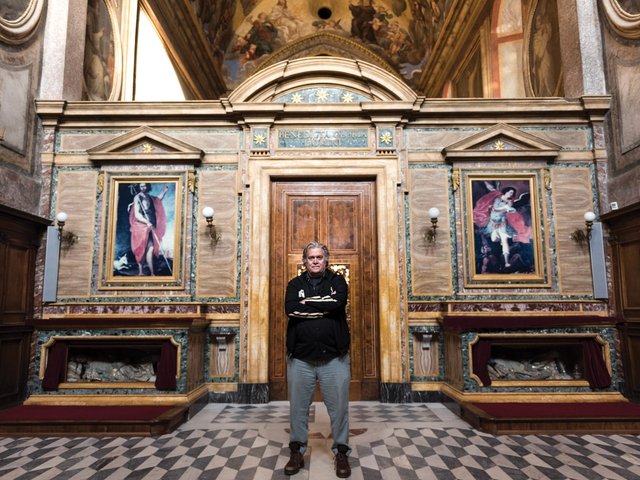An Italian tribunal has suspended the Ministry of Culture’s attempts to evict a right-wing religious group from a 13th-century monastery in central Italy.
In a ruling issued yesterday, the administrative tribunal of the Lazio region concluded that the Dignitatis Humanae Institute (DHI), a Catholic lobby group affiliated with the US president Donald Trump’s former chief strategist Steve Bannon, has the legal justification to contest an eviction order issued by the Ministry of Culture on 5 December. This gave the organisation 10 days to leave the Certosa di Trisulti, a hilltop abbey 70km southeast of Rome.
The DHI was awarded a 19-year lease on the medieval abbey last year as part of an Italian government initiative to involve the private sector in the management of cultural sites.
Following revelations that Steve Bannon and the DHI founder Benjamin Harnwell intended to use the building to launch a school for nationalists, the ministry annulled the lease on 16 October, citing irregularities in the DHI’s bid application. It also referred to “false or mendacious” statements made by Harnwell on the documents he submitted to the ministry for evaluation. Harnwell denies these irregularities and says no false statements were made.
After the lease was annulled, Harnwell made it clear that he does not intend to leave the historic abbey until his appeal of the annulment is heard. The Ministry of Culture then issued an eviction order on 5 December which Harnwell immediately contested.
The ruling issued by the administrative tribunal yesterday suspends both the ministry’s eviction order of 5 December and the ministry’s lease annulment of 16 October, until Harnwell’s appeal of the latter is heard next March.
The Ministry of Culture had cited its ability to unilaterally annul the lease for the Certosa di Trisulti using a power known as “autotutela” which gives authorities in Italy the right to revoke or annul contracts in certain circumstances, but Harnwell’s lawyers argued that the ministry had failed to act within prescribed time limits.
The administrative tribunal agreed with Harnwell: its ruling states that the DHI’s argument is “not without legal foundation”. The ruling also adds that the ministry has cited “false or mendacious” statements made by the DHI in its attempt to secure the lease, but has failed to explain what these consist of.
The court ordered the Ministry of Culture to pay €1,000 to cover its costs.
Commenting on the ruling, Harnwell said: “the DHI has strenuously maintained from the beginning that the annulment of the lease was a totally illegitimate act driven by Italy’s powerful left for political, not legal, considerations. The court’s provisional ruling indicates that it also sees the Ministry of Culture’s arguments as little more than the legal equivalent of a banana taped to a wall”.
In a statement on its website, the Ministry of Culture says it will appeal the administrative tribunal’s ruling.
In November, we asked the Ministry of Culture why it had failed to notice the “false and mendacious” statements allegedly made by Harnwell on his application to lease the Certosa di Trisulti when it was evaluating his proposals for the building. Antonio Lampis, the director general of museums at the ministry, told The Art Newspaper that, at the time it was judging bids for the Certosa di Trisulti, the ministry was affected by “extreme staff shortages”.
UPDATE: this article was amended on 18 December to include a statement by the Ministry of Culture, which was released on their website after the time of publication. It was previously stated that the Ministry of Culture had decined to comment on the issue.




